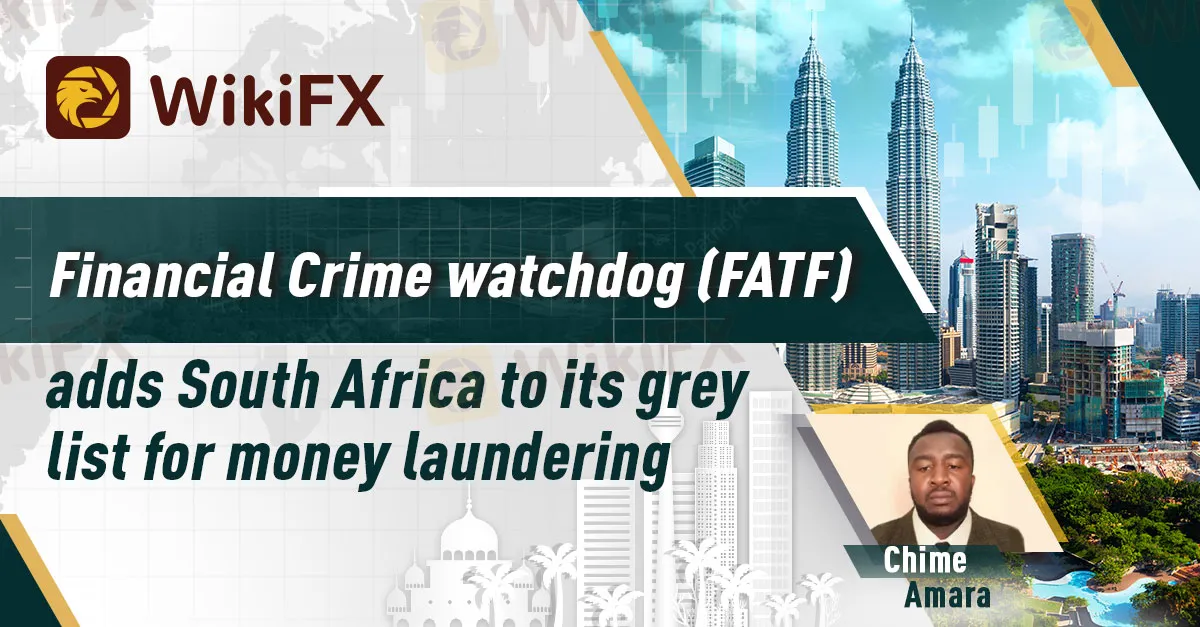简体中文
繁體中文
English
Pусский
日本語
ภาษาไทย
Tiếng Việt
Bahasa Indonesia
Español
हिन्दी
Filippiiniläinen
Français
Deutsch
Português
Türkçe
한국어
العربية
Financial Crime watchdog (FATF) adds South Africa to its grey list for money laundering
Abstract:The Financial Action Task Force (FATF) has added South Africa and Nigeria to its watch list for money laundering.

By: Chime Amara

In a move that has sent shockwaves through the financial industry, the has added South Africa to its grey list for money laundering, alongside Nigeria. The decision was made during a plenary session held by the international watchdog in Paris on February 24, 2023.
The grey list is a warning to countries that their financial systems are not up to scratch when it comes to combating money laundering and terrorist financing. Being on the grey list means that financial institutions operating in South Africa will face increased scrutiny, making it more difficult for them to do business internationally.
This is a blow to South Africa, which has been trying to improve its reputation as a financial hub and attract investment to its struggling economy. It is also a setback for the country's efforts to combat corruption and financial crime.
The FATF stated that South Africa has made progress in implementing its action plan to address the deficiencies in its anti-money laundering and counter-terrorist financing regime. However, the watchdog also noted that more needs to be done to fully address the identified weaknesses.
The South African government has responded to the news by saying that it is committed to working with the FATF to address the issues and to fully implement the necessary measures. The government has also emphasized that it takes the fight against financial crime and corruption very seriously.
The decision by the FATF to put South Africa on its grey list comes at a time when there is increasing global concern about the links between financial crime and terrorism. The international community is increasingly focused on preventing money laundering and terrorist financing, and countries that are seen as not doing enough to combat these threats risk being ostracized by the international financial community.
It remains to be seen what impact this decision will have on South Africa's economy and reputation as a financial center. However, the government will need to take swift action to address the issues identified by the FATF if it is to avoid further damage to its reputation and the wider economy.

Disclaimer:
The views in this article only represent the author's personal views, and do not constitute investment advice on this platform. This platform does not guarantee the accuracy, completeness and timeliness of the information in the article, and will not be liable for any loss caused by the use of or reliance on the information in the article.
Read more

OPEC's Profound Influence on the Oil Market
At present, oil prices remain relatively stable, but global economic recovery and shifting market demands continue to drive price fluctuations. Amid an uncertain global economic and geopolitical landscape, OPEC’s policies and actions remain key determinants of oil prices.

What Euro Investors Can't Afford to Miss
For euro investors, geopolitical factors, inflation data, and the European Central Bank's policy direction will determine the market trends over the next few months.

How Big is the Impact of the USD-JPY Rate Gap on the Yen?
The U.S. Federal Reserve's repeated rate cuts and the narrowing of the U.S.-Japan interest rate differential are now in sight. So, why is the U.S.-Japan interest rate differential so important for the yen’s safe-haven appeal, especially when global economic uncertainty rises?

Malaysian Man Killed in Alleged Forex Dispute-Related Attack
A 44-year-old Malaysian businessman, Wong Kai Lai, died after being attacked by about 20 men in Jenjarom, Kuala Langat, on 19 December. Police believe the attack may have been linked to a foreign currency exchange dispute.
WikiFX Broker
Latest News
PH SEC Issues Crypto Guidelines for Crypto-Asset Service Providers
FTX Chapter 11 Restructuring Plan Activated: $16 Billion to Be Distributed
Think Before You Click: Malaysian Loses RM240,000 to Investment Scam
Share Industry Insights and Discuss Forex Market Trends
Top 9 Financial Fraud Cases in Recent History
KuCoin Pay Introduces Easy Crypto Payments for Merchants
Malaysian Man Killed in Alleged Forex Dispute-Related Attack
Is OneRoyal the Right Broker for You?
How Big is the Impact of the USD-JPY Rate Gap on the Yen?
What Euro Investors Can't Afford to Miss
Currency Calculator






